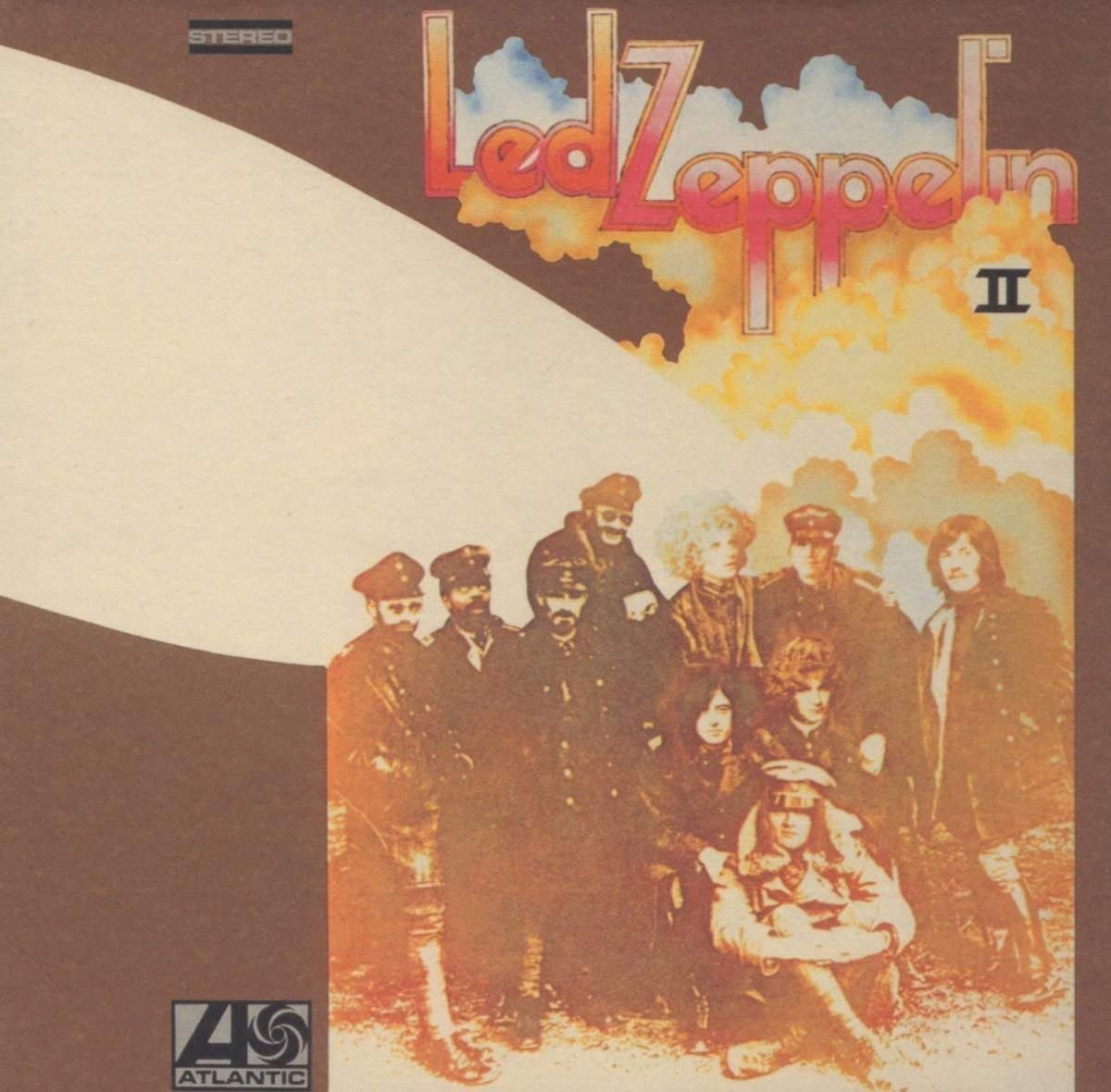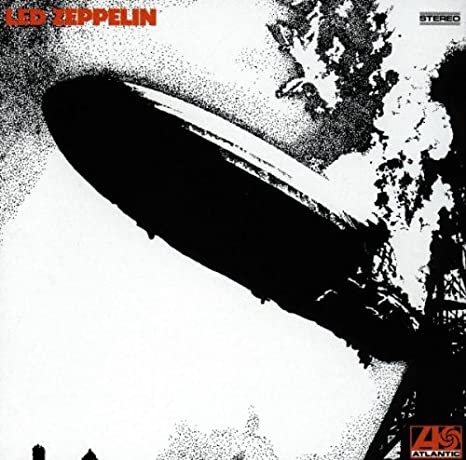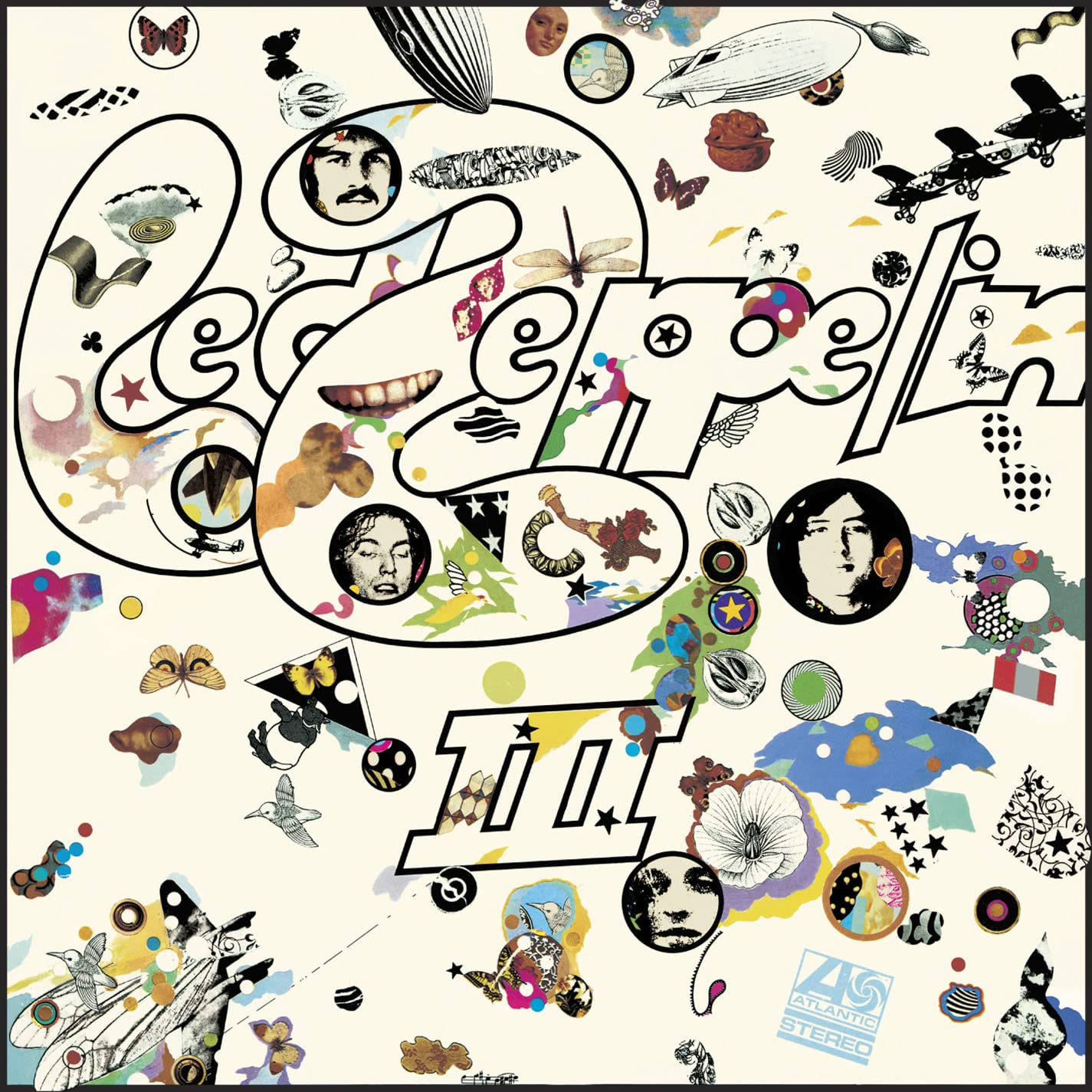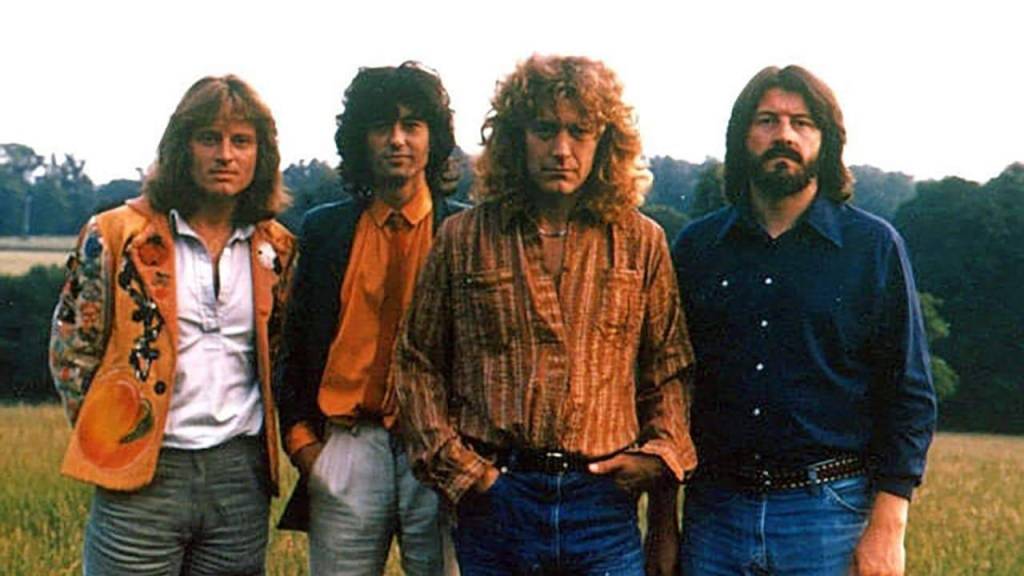All images courtesy of Led Zeppelin Facebook (official)

By Andrew Daly
andrew@vinylwriter.com

When assessing the music of Led Zeppelin, or the best guitars for metal, there are a great many pitfalls one can come upon. The very task is loaded with tripping hazards, sharp edges, and near-death experiences designed to push even the most seasoned writer to their very limits.
It’s with that in mind that I, as many others have before, attempt to rank the mighty Led Zeppelin’s nine album studio catalog.
If you came in expecting me to adhere to the working standard of previous lists, you’ve come to the wrong place. If you were expecting me to fawn over tracks that FM radio, or the Rock and Roll Hall of Fame voting committee says are “best,” once again, you’ve come to the wrong place.
For those of you that are looking for a fresh take, a different spin, or a more defiantly brave approach, this list will be for you. That said, this is not a list designed for shock value, and while I am more than certain that my rankings will garner their share of would-be arm-chair critics who claim they know better, I am prepared for the windfall.
In the end, I’ve run through Led Zeppelin’s studio output and ranked them via a grueling set of standards, and in my estimation, I’ve given each and every album its due justice, providing insight into each record’s strengths, weaknesses, and the perceptions that got us there.
Led Zeppelin, in my opinion, is rock music’s most legendary band, one which has no equal and probably never will. Attempting to rank their albums could be seen as a fool’s game, but still, I’ve endeavored to do so.
Let’s see where the output of Page, Plant, Bonham, and Jones lands once the proverbial deck has been shuffled.
9)  Coda (1982)
Coda (1982)
Often overlooked by fans, Coda, in effect, amounts to something of a final serving of studio Zeppelin. The album was released some two years after the death of Zeppelin’s drummer, John Bonham, and is mostly a collection of outtakes saved up over the course of the band’s career. While Coda may not be Zeppelin’s finest hour or even a true studio album per se, it is still a strong collection of songs in a vacuum. Looking at Coda objectively, and not judging it against Zeppelin’s eight official studio albums is key here. If you are able to ignore some of the unevenness, tracks such as “Darlene,” “Ozone Baby,” and “Wearing and Tearing” will leave you wondering why these songs were left off Zeppelin’s 70s albums in the first place. Coda may well be Zeppelin’s “worst,” but pitted against many other bands’ best, it still crushes the competition.
8)  Led Zeppelin II (1969)
Led Zeppelin II (1969)
Not but two album into this list, and I’ve already committed what many will see as heresy by placing an album that many hold sacred at number eight. To be clear – my placement of Led Zeppelin II does not diminish its place in rock history. In actuality, I love Led Zeppelin II, with a caveat – I love Led Zeppelin II for what it is, not what it’s perceived to be. I’ll explain. I personally love all of Zeppelin’s work, but I do find some of their earliest efforts to be a bit redundant. While I see Led Zeppelin II as a hard-rocking affair, I also see a band that hadn’t fully found its creative footing yet. Instead, in its infancy, Zeppelin would often take to paying homage to their blues heroes, and even took that a step further by littering their early setlists with covers, something the band would do much less of in its latter, more established years. Truth be told, like most fans of hard rock, I do enjoy the album. Of course, “Whole Lotta Love,” and “Ramble On” are classics, but “Heartbreaker” is overrated, as is “Moby Dick.” Still, I’d be lying if I said it wasn’t a fun listen. Sometimes legend can overtake us, as such, I would make the argument that Zep II’s perpetuated influence is overstated in the grand scheme.
7)  Led Zeppelin (1969)
Led Zeppelin (1969)
Here I go again, making outlandish claims without merit. But if you think about it…am I, though? As I alluded to regarding Led Zeppelin II, the music of the band’s early days is a fun, and blues-laden listen. But when I think of Led Zeppelin, I think of a band who grabbed the world by the balls and innovated an entire genre. And if that’s the case, for me, I simply don’t get those vibes when I listen to Led Zeppelin’s self-titled. Yes, “Good Times, Bad Times,” “Communication Breakdown,” and “Dazed and Confused” are legendary, but how about the album’s other six tracks? Are they great, or are they just good? Ultimately, that’s for readers to decide, but for me, Led Zeppelin’s debut is a lot of lifted riffs and finding one’s way. Led Zeppelin’s self-titled was a great first pass, but it’s obvious that the band had not fully augmented their sound and songwriting approach yet. Did they stumble on a few monster classics for future great hits compilations? Sure. But for an album to be considered “great,” in my opinion, I need more depth to draw me in for repeated listens. The three aforementioned tracks will forever be important to rock history, and for that reason, this album is worth going back to. That said, with its debut record, Led Zeppelin showed the world they while were onto something, they had not fully arrived just yet.
6)  Presence (1976)
Presence (1976)
Here’s an album that gets next to no attention, and I will never understand why. For those not familiar with the band and it’s history, Presence was recorded in the wake of what is looked back on as the most prolific, and bustling time in Led Zeppelin’s history. From 1969 through 1975, Led Zeppelin recorded six albums and found themselves a band continuously on the road. By 1976, the band was facing the side effects of burnout, and wading through a multitude of interpersonal issues, which included, but were not limited to Robert Plant recovering from serious injuries resulting from a car accident, and both Jimmy Page and John Bonham beginning to deeply spiral into drug and alcohol dependency respectively. Even in the face of that adversity, the mighty Zeppelin still put forth an immense effort. It’s incredible to look back and think that for much of the sessions, Robert Plant wasn’t able to fully stand while recording his ever-powerful vocals and that Jimmy Page was relatively strung-out while he mixed the album throughout multi-day sleepless benders. Presence is sadly overlooked in the Zeppelin catalog, and while I won’t claim it to be the band’s best, tracks such as “Achilles Last Stand,” and “Nobody’s Fault But Mine” are some of the most powerful music Led Zeppelin ever laid to tape. If you’ve been sleeping on this record, this is your official wake-up call.
5)  Led Zeppelin IV (1971)
Led Zeppelin IV (1971)
I promise the aim of this list is not to incite riots, and yet here we are with another placement that may well do just that. Again – I am fully aware of Led Zeppelin IV’s enduring influence, and I wouldn’t dream of trying to say otherwise. This said, oftentimes, Led Zeppelin IV is bandied about as Zeppelin’s “best record,” and for me, that just isn’t the case. Is this a great record? Of course, it is. But “most played on FM radio” does not always equate to “best.” I can’t overly criticize this album, as tracks such as “Black Dog,” “Rock and Roll” and “Misty Mountain Hop” absolutely rock, with “Four Sticks” being a personal favorite. And then you’ve got cuts such as “The Battle of Evermore,” and “Going to California” which showcased the bands’ maturity, and depth of songwriting. All in all, Led Zeppelin IV’s eight tracks are all quality, and the album plays through wonderfully start to finish leading to to the albums cavernous closer, “When the Levee Breaks.” I do however wish the record had more stout production akin to Presence, as I think the more rock-oriented tracks could have benefited from it. My last comment is that while “Stairway to Heaven” is classic, and well-loved, it’s supremely overrated, and the idea that a guitar solo scotch-taped together from multiple parts is considered “the greatest of all time” is a bit of a cumbersome argument, to be fair.
4)  Physical Graffiti (1975)
Physical Graffiti (1975)
Physical Graffiti is an album that’s tough to judge. At fifteen tracks, some of which are extremely long, the 1975 opus can be a bit hard to digest for some. Indeed, I would deem Physical Graffiti one for the die-hard fans, as opposed to listeners who want to be in and out at three minutes a song. What I personally adore about this record is its varied approach. From the outside looking in, a casual observer might look at this album as one with absolutely no plan going in, and in a sense, I can see why, as Physical Graffiti is a bit all over the place on a song-to-song basis. I see Physical Graffiti as a manifestation of the band’s deepest musical yearnings, and for me, the tracklisting reads as an explosion of torrid creativity laid to tape. As I listen back, tracks such as “Kashmir,” “Ten Years Gone,” and “Trampled Underfoot” still hold up. Furthermore, if you’re into deep-cuts, Physical Graffiti has those in spades with “Custard Pie,” and “Down by the Seaside” proving ample diamond-in-the-rough status. And who could forget two of the band’s heaviest tracks “The Wonton Song,” and “Sick Again?” Lastly, if you’ve got the stomach for it, Zep’s over eleven-minute beast of a song “In My Time of Dying” is nothing short of inspired. While not a concept album, Physical Graffiti, through a lack of perceived cohesion, does tell a story of the band to that point. I call this album the band’s “sign-marker,” one which they would never be the same thereafter.
3)  Led Zeppelin III (1970)
Led Zeppelin III (1970)
In Led Zeppelin III, we come across another case of an album that is criminally overlooked. For casual fans, and listeners of FM radio, this is, “The album with ‘Immigrant Song’ on it.” As a long-time fan of the band, and historian of the genre, the lack of love for Led Zeppelin III is downright disturbing. From my vantage point, Led Zeppelin III is where Zeppelin became Zeppelin. Finally, the Led Zeppelin stopped nicking riffs from its forefathers, and shifted its focus away from what I’ll call “post-blues,” and in doing so, began its intense musical experimentation, and a neverending quest toward greater rock ‘n’ roll enlightenment. I also find Led Zeppelin III to be one of Zeppelin’s most ironic records, as it contains the pro-metal “Immigrant Song,” which is often considered the band’s heaviest track, and then immediately deviates into a folk-rock affair from there forward, more or less. Personally, it kills me that tracks such as “Tangerine,” “Out on the Tiles,” and “Celebration Day” don’t get more love. These are great tracks, and Led Zeppelin III is full of inspired, and nuanced songs, as well as showstopping performances. If you’ve overlooked this record to date, or are looking to dive deeper into Zeppelin’s career, this is a wonderful place to start. For me, this record holds serious water and carries heavy genre bearing weight.
2)  Houses of the Holy (1973)
Houses of the Holy (1973)
House of the Holy is universally loved by both casual and hardcore fans of Led Zeppelin, and it’s easy to see why. Zeppelin’s 1973 beast of a record is jam-packed with immense performances from start to finish, and the album’s production backs up the watershed songwriting. With Houses of the Holy, Zeppelin was coming off the heels of huge success after the release and touring cycle for Led Zeppelin IV. Riding high, Page, Plant, Bonham, and Jones entered the studio locked and loaded, and the results are nothing short of staggering. Of the album’s eight tracks, no less than six are absolute essential classics, perpetually littered across the zeitgeist through greatest hits albums, cover tracks, and FM radio play. From the first note of “The Song Remains the Same, to the final crash of “The Ocean,” Houses of the Holy grabs listeners by the balls and doesn’t let go at any single point. If you’ve never heard a single note of Led Zeppelin’s music, and are looking for an accessible entry point, Houses of the Holy is the album for you. It’s hard to argue against a record containing “Over the Hills and Far Away,” “D’yer Mak’er,” and “Dancing Days” being the band’s best, but we’re not done yet. Next up, we’ve got number one.
1)  In Through the Out Door (1979)
In Through the Out Door (1979)
As promised, there is one record laying in wait as number one on this list, and it’s a doozy. One might equate placing Led Zeppelin’s 1979 swan song In Through the Out Door at number one as nothing more than a grab for attention, but in this case, you’d be wrong. Now, not that it matters, but several of the record’s tracks, “All My Love,” “In the Evening,” and “Fool in the Rain” are perpetually played on classic rock radio. I find this something of a paradox, as these songs are emphatically beloved, but In Through the Out Door is not. More so, I’ve found that many fans berate this album to the point of loath, which has never sat well with me. I find In Through the Out Door to be a fascinating listen, as it consists of some of Led Zeppelin’s most heartfelt, in-depth, and multi-layered songwriting of its entire eleven-year career.
With Jimmy Page’s heroin dependency in full swing, Robert Plant reeling from the loss of his son, and John Bonham spiraling into the alcoholism that would ultimately see him meet his end, John Paul Jones truly carried this record. And while many fans dislike “Carouselambra,” I find the song a fun listen and a great look into the band’s willingness to experiment. In other tracks, such as “Hot Dog,” we see Zeppelin staking its claim amongst country rock. The record is loaded with emotive moments as well, such as “All My Love,” and “I’m Gonna Crawl,” which are touching affairs. Love or hate it, In Through the Out Door contains some of Led Zeppelin’s greatest tracks, with “In the Evening,” “Fool in the Rain,” and “South Bound Saurez” being worthy of comparison against anything the band ever recorded.
In retrospect, In Through the Out Door illustrates a mature band, that was in the midst of a changing scene, fighting hard against continued adversity. In the face of punk and new wave, Zeppelin defiantly dug in and crafted a final masterstroke. While I love the album, it’s bittersweet, as it shows what could have been ahead had Zeppelin been able to continue. Anyway, did I get your attention?

Putting together a list of this ilk is never easy, and surely, many fans and readers will bang the table in frustration over my perception of the band’s music.
While it’s easy to disparage and degrade any given person’s rankings, ultimately, we must remember that taste is subjective, and preference is always strictly personal. It’s within the confines of those battle lines drawn where the great debate begins.
While you might disagree with my thoughts, feelings, and overall breakdown of the band’s catalog, I am prepared to stand by my rankings, as I came to my conclusions through careful thought, consideration, and years upon years of listening to Led Zeppelin’s music.
As I’ve said before, I don’t arbitrarily disparage, and I don’t haphazardly award merit. While I’d never ask that you agree, or take any one person’s opinion, let alone my own as fact, I do urge readers, and listeners to apply those same principles when assessing this list.
Ultimately, when it comes to opinion, we all have one, and when it comes to personal preference, there is a fine line between fact and fiction. Where will you stand amongst the masses when the dust settles?
– Andrew Daly (@vwmusicrocks) is the Editor-in-Chief for www.vwmusicrocks.com and may be reached at andrew@vinylwriter.com





Leave a Reply